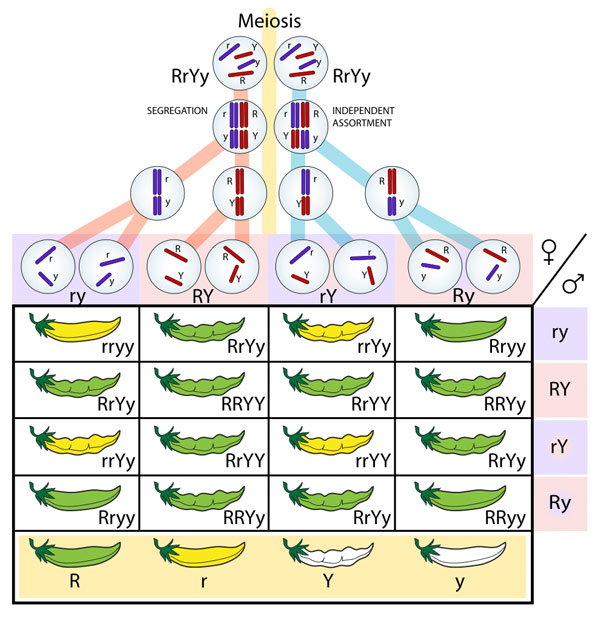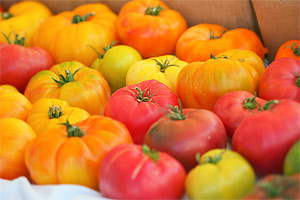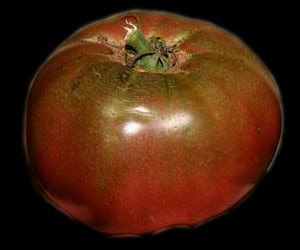GMO simply means "genetically modified organism". GE (genetically engineered) is also a related acronym you see floating around. At it's simplest it refers to any life form that has had it's DNA structure artificially manipulated from the inside.
If we want to get very specific it is the modern, scientific, genetic practice of inserting genes from one species into another, unrelated species. The donor and recipient can be a virus, bacteria, plant, animal, or fungus. Any living thing with DNA can be a donor or recipient.
How Does GMO Differ From Traditional Breeding?
One could point out that many plant and animal species have been bred and selected for particular traits over thousands of years. So how does GMO differ from traditional plant or animal breeding? It comes down to a matter of how the genes are manipulated.
With traditional breeding those individuals with the desired traits are selected as the parents for the next generation. Farmers and herders can't see the genes themselves, just the expression of those genes in terms of physical characteristics. If you want a carrot that's sweeter than use those individuals with sweetness to breed the next crop. Then look at all the offspring, select the sweet ones and encourage their exclusive breeding, and save their seed. Keep going season after season until you reach your desired super sweet carrot.
That may be an over simplification, but that's the general idea. Encourage the breeding of desirable individuals and cull the undesirable individuals. All based on what you observe about them.
Genetic engineering handles the development of new traits in an entirely different way. Need a tomato that's tougher for transport to markets? Insert a jellyfish gene to improve the integrity of the tissue so it can tolerate bumping around in transport trucks. Want to be able to blanket a whole field of corn with herbicide to kill the weeds but not the corn? Insert a gene that makes the corn resistant to that particular herbicide.
 An illustration of what happens with certain characteristics, and their coresponding genes, in pea plant reproduction. This chart shows the probability of offspring acquiring certain characteristics (color and smootheness). Well before humans discovered DNA we were manipulating the recombination of genetics by selecting individuals with certain traits, and culling ones that were undesireable. This is genetic modification, but NOT genetic engineering.
An illustration of what happens with certain characteristics, and their coresponding genes, in pea plant reproduction. This chart shows the probability of offspring acquiring certain characteristics (color and smootheness). Well before humans discovered DNA we were manipulating the recombination of genetics by selecting individuals with certain traits, and culling ones that were undesireable. This is genetic modification, but NOT genetic engineering.
Where To Find Non-GMO Seeds
Any seeds that are labeled USDA Organic are, by law, non-GMO. Part of the National Organic Program specifies that all seed, feed, and inputs (any substance applied to fields and crops) is not artificially genetically modified.
The only exception is when an organic farmer simply can't locate certified organic seed for their farm -- and the process of searching for, and not finding, organic seed must be documented. This can happen if a farm wants to try a new (non-GMO!) variety of vegetable and finds that no one sells it as certified organic. Even in that case the farm must not use GMO.
Fortunately, there are more and more sources for the home gardener for non-GMO seed. Some of the sources I could find at this time (2019) are:
- highmowingseeds.com
- johnnyseeds.com
- organicseedfinder.com
- pickacarrot.com
- seedsofchange.com
- seedwise.com
- southernexposure.com
- sustainableseedco.com
If there are any others you would like us to add to this list just drop us a line.
What About Heirloom Seeds?
"Heirloom" refers to plant varieties that have been cultivated by humans for many 10's to 1000's of years. Similar to the idea of family heirloom antiques being passed down from generation to generation, heirloom vegetables (and fruits and grains) continually have their seeds saved to be replanted by the next generations.
Heirloom varieties have had their genetics shaped over time by people that like certain characteristics. But, many of these varieties have become scarce, or gone out of favor, because they don't do well in modern, mechanized food production. Heirlooms can have some great flavor right from the field, but have terrible shipping qualities making them impractical for rough, world-wide shipping.
Heirloom tomatoes are a great example of a vegetable that has been shaped into many delicious varieties over the centuries, but that you rarely see in the supermarket. One in particular that I have grown, and love, is Cherokee Purple. What a fantastic fresh tomato! But, because of it's size and delicate structure it just can't be shipped across the country and be expected to arrive in saleable condition. Also, the color can be off-putting to some people that don't realize tomatoes can come in other colors than red. For the vast majority of people tomatoes MUST be red!
So, heirloom food plants are, by default, non-GMO. These varieties are so old that they are way before the time of genetics modification by direct DNA manipulation. Fear not, cultivating heirlooms will keep you squarely in the non-GMO camp.
Are There Any Good GMO's?
This, as you might have guessed, is a hot-button topic right now. Because a tremendous amount of money is invested by Big Ag companies to produce new GMO varieties their motive (ie. a profit motive) is to present the research in a favorable light.
And because so many people can smell the "spin" of deception with information coming from these companies there is tremendous wariness by people to believe that there's any good aspect to GMO. This is completely understandable. Big Ag? Money? Profits? What good could possibly come from this? It's a fair question.
But, if we can back up a bit and be open to the possibility that there might be some good that comes from this we'd find some interesting information. Golden Rice comes to mind. An idea that started way back in the mid-1980's, beta carotene genes were inserted into white rice, increasing the amount of Vitamin A available to people on rice-based diets.
Looking at the history of Golden Rice it's hard to see an evil downside to this one. Minor downsides, yes (like propietary ownership of the genes). But, totally evil? Read up on the issues with Golden Rice and see what you think.
Sources
Image of pea genetics can be found at Heredity at Wikipedia.
Image of heirloom tomatoes via Flickr by J. Morgan.
NPR reports on the controversy over Golden Rice and GMO's.

